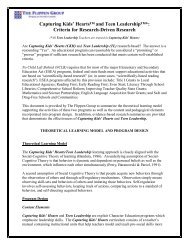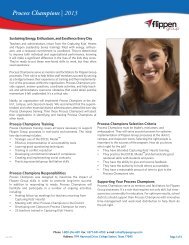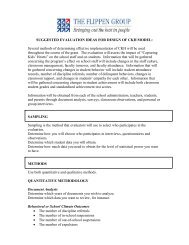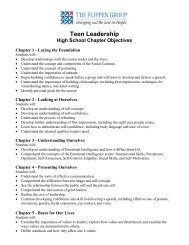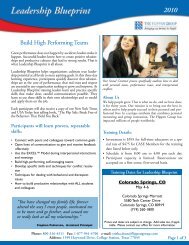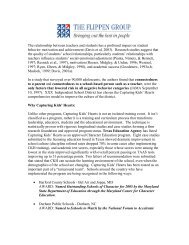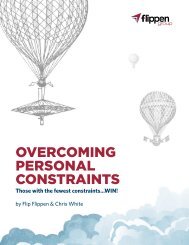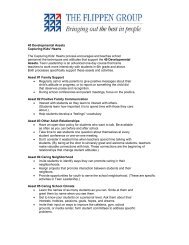Smart & Good High Schools - The Flippen Group
Smart & Good High Schools - The Flippen Group
Smart & Good High Schools - The Flippen Group
- No tags were found...
You also want an ePaper? Increase the reach of your titles
YUMPU automatically turns print PDFs into web optimized ePapers that Google loves.
CHAPTER 4: <strong>The</strong> Professional Ethical Learning Community<strong>The</strong> Interdependence of Excellence and EthicsPreviously we have discussed performance character (thepathway to excellence) and moral character (the pathwayto ethical behavior) as distinct goals in the school’s mission,touching briefly on how they are related. Here wewish to expand on the interdependence of excellenceand ethics, since we believe an appreciation of their interdependenceis necessary for a PELC to do its work effectively.How Ethics Impacts Excellence“First you reach ‘em, then you teach ’em.” “<strong>The</strong>y don’tcare how much you know until they know how much youcare.” <strong>The</strong>se and other such maxims tell us that a teacherstudentrelationship of respect and caring is the foundationfor teaching and learning.One researcher asked a group of African-American boyswho were on the verge of failing, “If you could startover, what would you tell teachers to do that wouldmake a difference?” After a silence, one boy finally saidthat if teachers “cared or at least pretended to care abouthim, his attitude toward school and studying wouldimprove.” 3 <strong>High</strong> school students we spoke with in ourown site visits repeatedly commented that when theyfelt a personal connection with the teacher, theyworked harder.Similarly, nothing is more subversive of the school’s missionthan perceived unfairness or lack of respect and caringin how people are treated. When a teacher is uncivil,plays favorites, or puts students down, or when a schooladministrator is disrespectful to staff, students, or parentsor reduces normal disciplinary consequences for a starathlete or the child of a school board member, the effecton moral climate—and on the motivation of students andstaff to give their best effort—is corrosive.<strong>The</strong> “macro” ethical issues are equally important. <strong>Schools</strong>exist in, and are affected by, the wider culture. Universalprinciples such as justice, caring, and respect create therequisite conditions for effective teaching and learning.<strong>The</strong> most effective teaching and learning cannot takeplace in a community or society where injustice existsunchallenged. Race, poverty, health and safety, economics—theseclassic systemic issues can create real or perceivedinequities that subvert the mission of schools.<strong>Schools</strong> and students can, to some degree, overcome suchinequities, but not without some cost to the educationalprocess.How Excellence Impacts EthicsJust as ethics impacts excellence, excellence also impactsethics. This was demonstrated in a study of studentengagement by Katherine Wentzel, who asked middleschool students about the kinds of teacher behaviors theyinterpret as “caring.”Question 1: How do you know when a teacher cares aboutyou?✔ Teacher tries to make classes interesting.✔ Teacher talks and listens to students.✔ Teacher is honest, fair, and trusting.✔ Teacher shows concern for students as individuals byasking whether they need help.✔ Teacher makes sure students understand what is beingtaught.✔ Teacher asks students if something is wrong.Question 2: How do you know when a teacher does not careabout you?✔ Teacher is boring or off-task.✔ Teacher continues teaching when students aren’t payingattention.✔ Teacher ignores, interrupts, embarrasses, insults, oryells at students.✔ Teacher shows little interest in students by forgettingstudents’ names and not doing anything when they didsomething wrong.✔ Teacher doesn’t try to explain something when studentsdon’t understand. 4What are students saying here? Two things: <strong>The</strong>y feelcared about when teachers treat them with respect, don’tignore or embarrass them, and so on; but they also feelcared about when teachers teach well—in a way that enablesthem to learn.Students feel cared about whenteachers teach well.In this sense, excellence is an expression of ethics; it is byhelping students do their best work that we show howmuch we respect and care about them. Not to challengeand help students perform at their best level is to showthem disrespect. <strong>The</strong>refore, developing a professional62<strong>Smart</strong> & <strong>Good</strong> <strong>High</strong> <strong>Schools</strong>




